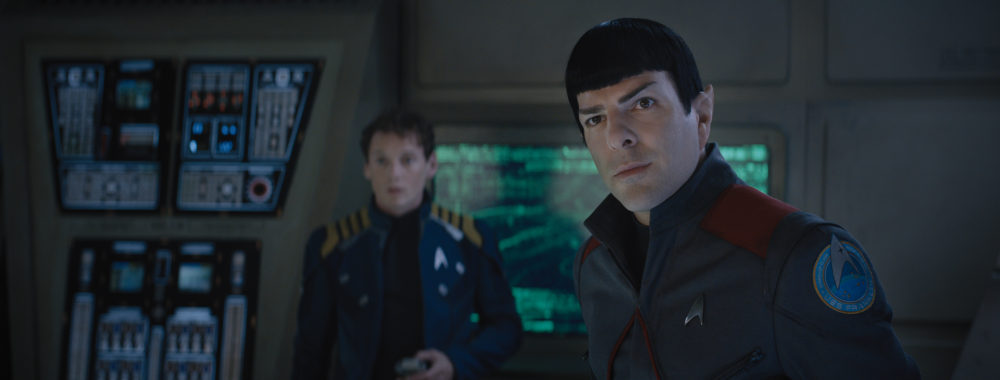“The value of ‘X’ is that it remains constant.” Looking for meaning in everything, that’s what I took away from a Saturday morning television show called Filmore. The show is long gone, the victim of an overzealous Disney executive trying to cut costs and Saturday morning cartoons in general. That line has always stayed with me though. It’s a terrific quote that keeps paying dividends. Star Trek Beyond, the movie that kicks JJ Abram’s reboot franchise into trilogy territory, reminded me of that quote. It just arrived at movie theaters worldwide this weekend.
Star Trek fans are naturally worriers. With every film or television show release, the same old fears come back. They worry about how authentic to the Roddenberry-era each movie will be. They want the series refreshed for a brand-new generation, but they don’t want that freshness to erode what they feel makes the franchise so capable of attracting die-hard fans. Those people needn’t worry about Star Trek Beyond.
Star Trek Beyond is a movie that balances those concerns well. Beyond starts with the crew we’ve all grown to love over the last few years. When we last saw James Kirk he was on Earth dedicating a completely trashed Enterprise. He’d just fought for the soul of Starfleet, insisting that the organization was a band of explorers, not a military force without scruples. It’s been years since that dedication. Kirk has aged, the crew is battle tested and thinks they’re ready for just about anything.
Kirk has aged, the crew is battle tested and thinks they’re ready for just about anything.
The Enterprise comes up against a pretty dangerous foe. He’s as ruthless as past villains, but not nearly as fleshed out. That was the first problem I had with Star Trek Beyond. Kraal, whose played by ridiculously good actor Idris Elba, makes for the most uninteresting villain I’ve ever seen in a Trek film. Rather than this being the fault of Elba himself, it’s the writing that makes Kraal basic. His motivations aren’t known for a long time. Once they’re revealed, you are left wondering whether the writers stuffed some existential, thought-provoking reason for his mass murdering tendencies late in the film.
Star Trek Beyond clearly tries take on heavy themes of human interaction and exploration, but they fail. They fail spectacularly.
Under Director Jeremy Lin, we knew we were going to be in for some huge battles and we get them. They always end in a climatic flurry of broken conduits, explosions and enlisted offers flying out into space. Personally, I found all of them entertaining, even if Columbus “discovered” America in less time than they take to start and end.
I’m a bit saddened that Lin chose to keep the over-the-top CGI and style of the earlier movies around. Beyond introduces a space station so intricate and ridiculous looking that even I found myself marveling at the sheer gull that folks in the crew had when designing it. I suppose, three movies in isn’t the right time to go rethinking your overuse of CGI.
So Star Trek Beyond has long space battles, a laughable moral premise at the heart of its story and a space station that looks like a two-year-old drew it on a napkin during lunch at a restaurant that lacked paper placemats and Crayola crayons. Strangely, I still like the film.
It’s X that saves Star Trek Beyond.
It’s X that saves Star Trek Beyond. It’s been decades since they tumbled out of Gene Roddenberry’s head. Still they hold up. Better, they save the movie.
For all the plot holes, there’s plenty to appreciate. Star Trek Beyond is funny yet serious. Kirk, Spock, Uhura, McCoy and Chekov play off each other in ways that the audience will find interesting. You get to know them more in this film than the two previous installments, and their personalities stay true to their original characters. That’s a win for the longtime fans. Karl Urban’s McCoy is by far this franchises’ best character, in my opinion.
Also a win is the theme of exploration that’s key to this film. The writers may have bungled the big narrative, but the cast is in uncharted territory exploring a place they’ve never been with rules that they don’t understand. So what they’re problem solving to fix a story-wide problem? I’d rather watch this than the twenty solid minutes of phaser fire and hall running from the other two films.
Also, the film should be commended for making references to, but not heavily borrowing from past films in the franchise. There are little nuggets for the longtime fans to appreciate, including references to the original crew. They’re not too overdone though, and the less than fully Trek educated won’t feel like they’re missing out.
Star Trek Beyond isn’t a terrific film.
Star Trek Beyond isn’t a terrific film. Anyone who says so is lying to you. The story issues prevent it from being so. Star Trek Beyond is a perfect summer buddy blockbuster. That’s exactly what the film franchise was rebooted to be.
The narrative is as weak as the gravity on a space station with skyscrapers, but the sense of family is on point. Watching Beyond is like heading back to your old neighborhood to see what your friends have been up to. You remember why you still call it home. As you head to your car, keys in hand, you wish you could have stayed a bit longer.
